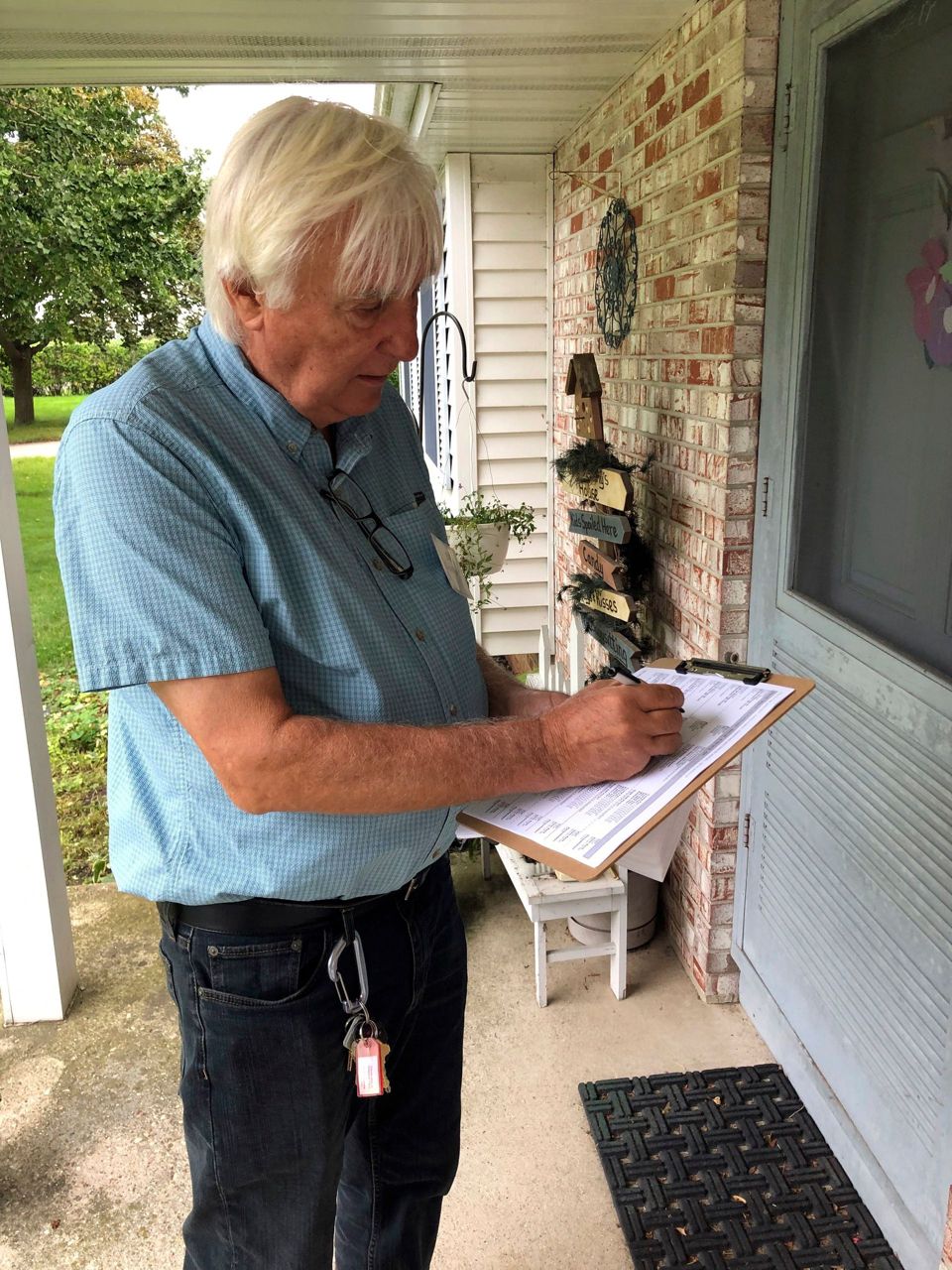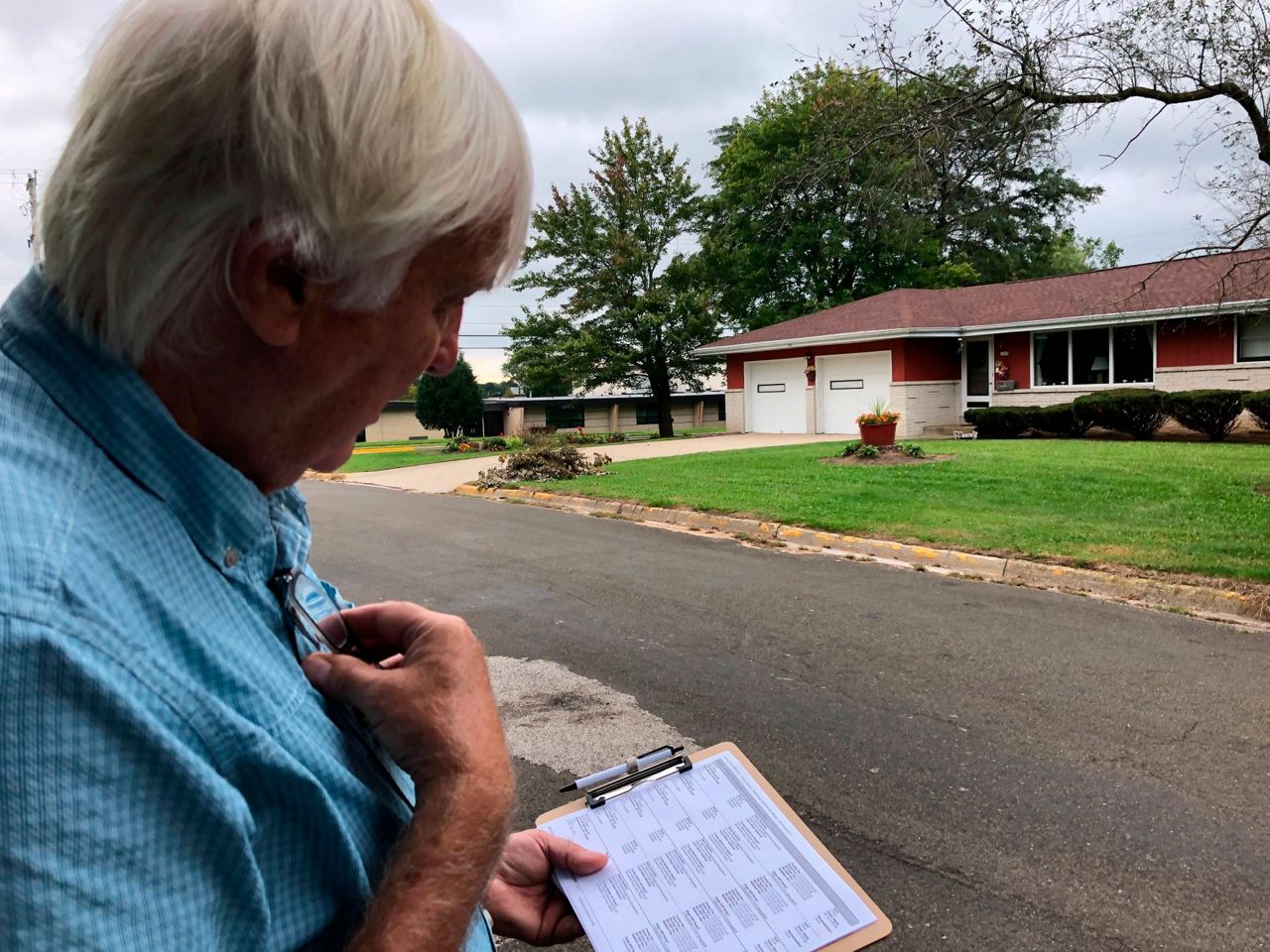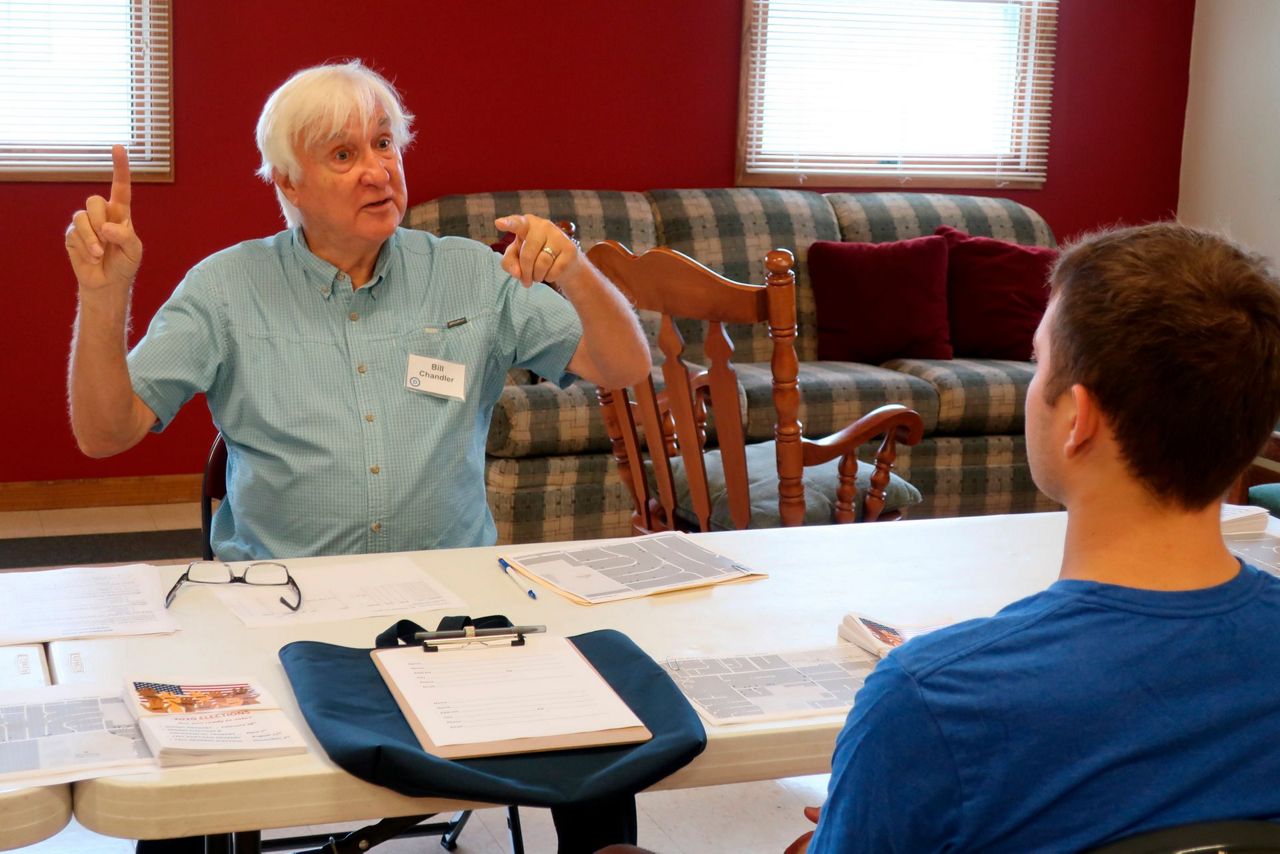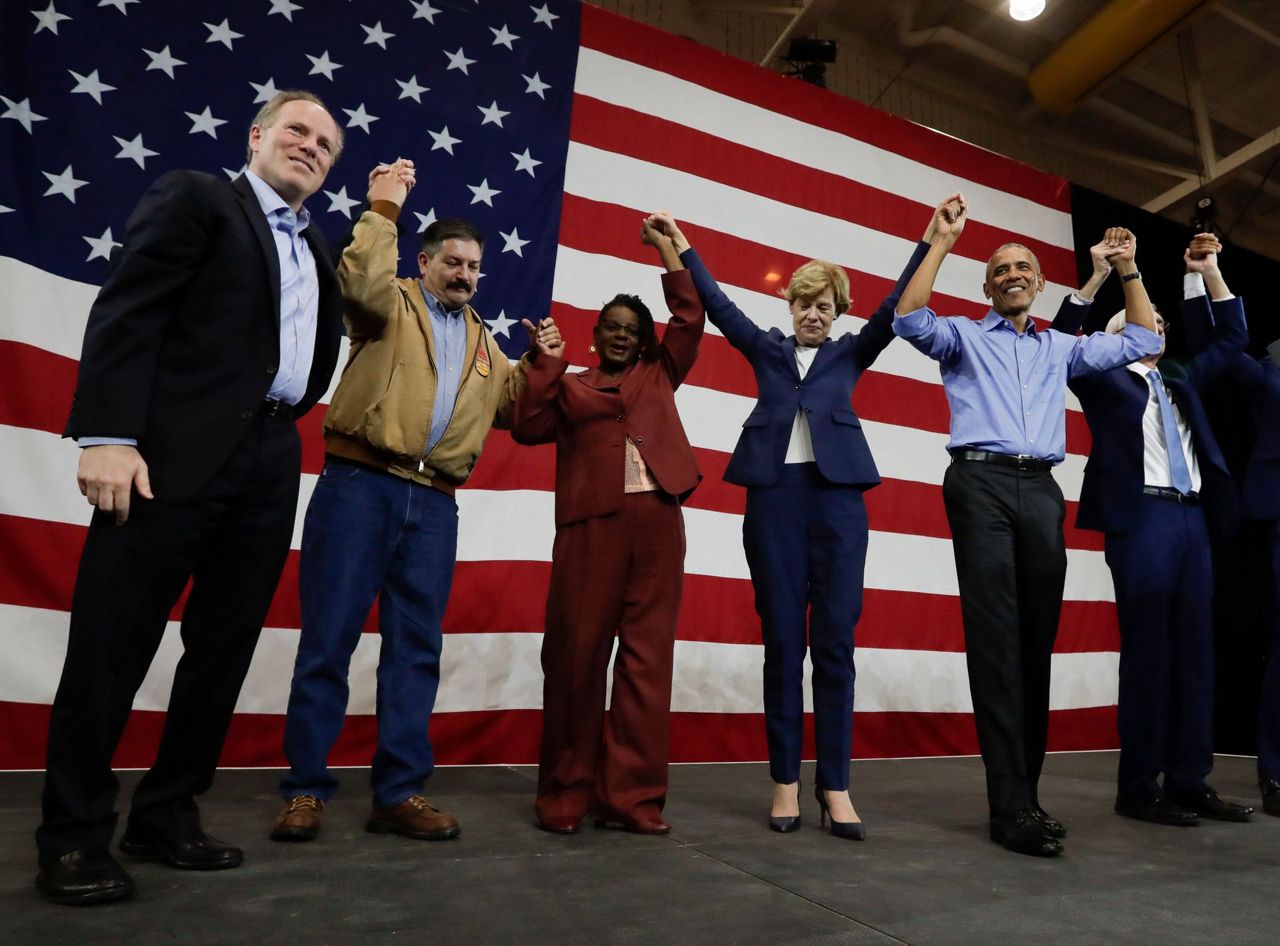WHITEWATER, Wis. (AP) — It's 10 a.m. on a Saturday in late September — 200 days from Wisconsin's presidential primary, nearly 14 months from Election Day 2020— and retired orchestra teacher Bill Chandler is out talking to his neighbors about politics.
Tromping from yard to yard in the small town of Whitewater, he carries a clipboard listing persuadable voters in one hand and a stack of handouts listing 2020 election dates in the other. The 71-year-old looks up at a looming rain storm, and optimistically sums up his mission.
"It's neighbor to neighbor," he said. "The grass roots, from people to people, overrides money."
Chandler is executing the Democratic strategy to win back Wisconsin — a block-by-block rebuilding of the infrastructure they let crumble ahead of the last presidential election. Many Democrats in Wisconsin, and across the Rust Belt states that President Donald Trump flipped Republican in 2016, believe their weak neighborhood network contributed to their defeat. Hillary Clinton's presidential campaign relied too heavily on ads and paid canvassers, with disastrous consequences, they say.
The new plan in Wisconsin and other battleground states is simple: Do what Barack Obama did. The former president easily won Wisconsin twice by building an organization based on neighborhood organizing, local volunteers and personal relationships. It worked so well for Obama, Republicans are trying it, too, training local volunteers who can return to their neighborhood and deliver the president's message with a personal touch.
"It's going to be a massive ground game," said Wisconsin Republican Party Chairman Andrew Hitt. "Our strategies are not that different."
The fact that both parties are already investing in robust organizing operations — months before Democrats even have a candidate — speaks to Wisconsin's potential as a make-or-break state in 2020. At the core of the game plan is engaging voters early, where they live, with people from their towns who can connect with them on a personal level about politics. Advocates believe the human connection is more effective — particularly in these polarized times — than TV ads or campaign staff flown in from out of state.
Research has shown over and over that the most effective political organizing is done locally, with voters more apt to be persuaded by someone who has a personal connection, said Lara Putnam, chair of the history department at the University of Pittsburgh who has studied grassroots social movements.
But neighborhood organizing takes a lot of time and energy to do properly. And for Democrats, key parts of Obama's network, like labor unions, particularly in Wisconsin, have diminished in size and influence, Putnam said.
One focus for Democrats is Milwaukee, Wisconsin's largest and most liberal city. Even so, Democrats have struggled in recent years to bolster political engagement and turnout. The biggest failure was in 2016, when an estimated 20% drop off in black voters in the state was cited as one of the main factors that contributed to Trump's victory, ending a Democratic presidential winning streak dating to 1988.
To turn it around, Democrats have chosen Milwaukee to host the national convention in July. They're investing early and heavily not only in Milwaukee but in its key suburbs and more rural parts of the state.
Wisconsin Democrats started rebuilding their neighborhood teams in the spring of 2017 and now have 250 operating across the state. Those teams knocked on twice as many doors ahead of the 2018 election than the Clinton field operation did in 2016, said state party chairman Ben Wikler. He calls it the Democrats' "secret sauce."
The Democratic Party has also already hired 13 field organizers across the state, far more than Clinton had in place at this time four years ago, Wikler said.
Wisconsin is also one of seven states where the Democratic National Committee is running a program known as Organizing Corps 2020. College students expecting to graduate next June are put through an eight-week organizing program while they're still in school, so they can get to work as full-time field organizers as soon as they graduate. Twenty-nine are on track to graduate and begin work, Wikler said — most of them students of color from Milwaukee.
Another tactic being used by a coalition funded mostly by labor and education unions called For Our Future is "relational organizing," which relies on people identifying friends and others who may be persuaded to become more politically active and vote.
The idea is to complement the neighborhood organizing approach with an even more personal appeal that works better than having strangers knock on a door and ask for support, said Joe Zepecki, a spokesman of For Our Future in Wisconsin.
"That personal connection of 'Please go vote, for me' is far more effective," Zepecki said.
The Republican National Committee has been promoting a neighborhood team model similar to what Obama used for the past couple election cycles, said Wisconsin Republican Party Executive Director Mark Jefferson.
Jefferson, who worked at the RNC for eight years, including as a regional political director, before returning to Wisconsin earlier this year, said the party is focusing on improving its data to target the right voters. The key, he said, is then having people who live in the same area contact those voters.
"In these politically charged times, if you can have a neighbor or someone from the area at your door, it dials down the rhetoric from what you may see on TV," Jefferson said.
Chandler, the door-knocker, tells the people he meets that just like them he's from Whitewater, a town of about 15,000 in a rural pocket of the state between the urban Democratic hubs of Madison and Milwaukee. Whitewater straddles two counties that Trump won handily when he narrowly carried the state.
The handout Chandler and others were distributing this Saturday emphasized 2020 election dates, how and where to register to vote. It gives general Democratic positions on a variety of issues. There's no mention of Trump or any of the Democratic presidential candidates.
The aim is to build a relationship that predates the partisan slugfest of high campaign season.
That is what Chandler is hoping.
"It's going to expand our territory to people we normally wouldn't reach," he said, approaching another house. "This is very important, as Barack Obama proved."
___
Follow Scott Bauer on Twitter: https://twitter.com/sbauerAP
Copyright 2019 The Associated Press. All rights reserved. This material may not be published, broadcast, rewritten or redistributed.



